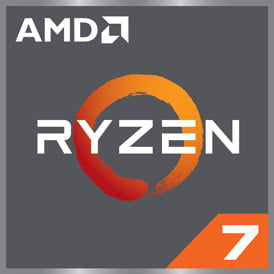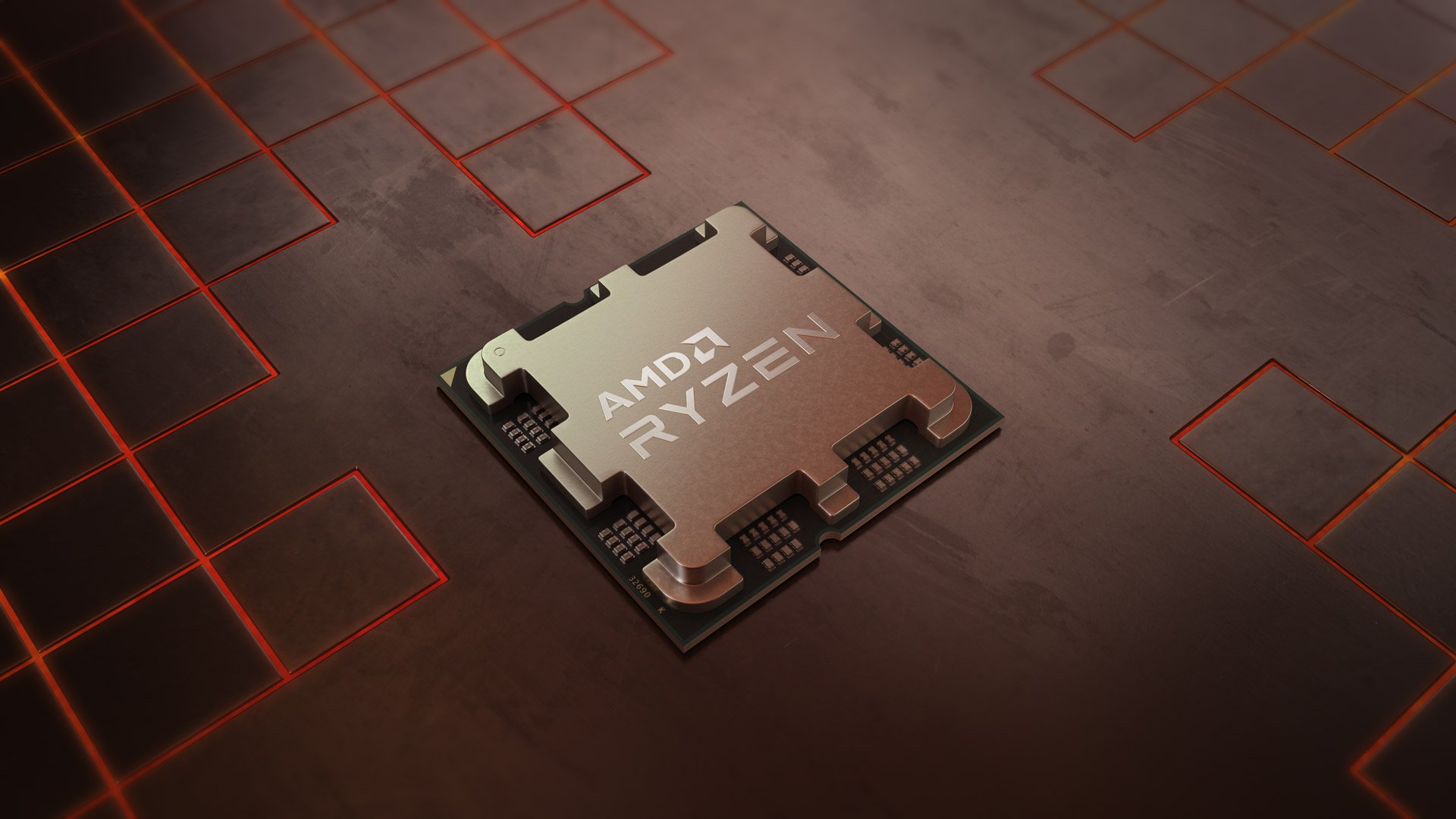
AMD Ryzen 7 2700X Benchmark, Test and specs
Last updated:
The AMD Ryzen 7 2700X has 8 cores with 16 threads and is based on the 2. gen of the AMD Ryzen 7 series. The processor uses a mainboard with the AM4 (PGA 1331) socket and was released in Q2/2018. The AMD Ryzen 7 2700X scores 1,062 points in the Geekbench 5 single-core benchmark. In the Geekbench 5 multi-core benchmark, the result is 7,100 points.

| Name: | AMD Ryzen 7 2700X |
|---|---|
| Family: | AMD Ryzen 7 (67) |
| CPU group: | AMD Ryzen 2000 (9) |
| Architecture: | Pinnacle Ridge (Zen+) |
| Segment: | Desktop / Server |
| Generation: | 2 |
| Predecessor: | -- |
| Successor: | AMD Ryzen 7 3700X |
CPU Cores and Base Frequency
The AMD Ryzen 7 2700X has 8 CPU cores and can calculate 16 threads in parallel. The clock frequency of the AMD Ryzen 7 2700X is 3.70 GHz (4.30 GHz). The number of CPU cores greatly affects the speed of the processor and is an important performance indicator.
| CPU Cores / Threads: | 8 / 16 |
|---|---|
| Core architecture: | normal |
| Cores: | 8x |
| Hyperthreading / SMT: | Yes |
|---|---|
| Overclocking: | Yes |
| Frequency: | 3.70 GHz |
| Turbo Frequency (1 Core): | 4.30 GHz |
| Turbo Frequency (8 Cores): | 3.85 GHz |
Memory & PCIeThe processor can use up to 64 GB memory in 2 (Dual Channel) memory channels. The maximum memory bandwidth is 46.9 GB/s. The memory type as well as the amount of memory can greatly affect the speed of the system. |
|
| Memory type: | Memory bandwidth: |
|---|---|
| DDR4-2933 | 46.9 GB/s |
| Max. Memory: | 64 GB |
| Memory channels: | 2 (Dual Channel) |
| ECC: | Yes |
| PCIe: | 3.0 x 20 |
| PCIe Bandwidth: | 19.7 GB/s |
Thermal ManagementThe thermal design power (TDP for short) of the processor is 105 W. The TDP specifies the necessary cooling solution that is required to cool the processor sufficiently. The TDP usually gives a rough idea of the actual power consumption of the CPU. |
|
|---|---|
| TDP (PL1 / PBP): | 105 W |
| TDP (PL2): | -- |
| TDP up: | -- |
| TDP down: | -- |
| Tjunction max.: | 95 °C |
Technical details
The AMD Ryzen 7 2700X is made in 12 nm. The smaller the manufacturing process of a CPU, the more modern and energy-efficient it is. Overall, the processor has 16.00 MB cache. A large cache can greatly speed up the processor's speed in some cases such as games.
| Technology: | 12 nm |
|---|---|
| Chip design: | Chiplet |
| Socket: | AM4 (PGA 1331) |
| L2-Cache: | -- |
| L3-Cache: | 16.00 MB |
| AES-NI: | Yes |
| Operating systems: | Windows 10, Windows 11, Linux |
| Virtualization: | AMD-V, SVM |
|---|---|
| Instruction set (ISA): | x86-64 (64 bit) |
| ISA extensions: | SSE4a, SSE4.1, SSE4.2, AVX2, FMA3 |
| Release date: | Q2/2018 |
| Release price: | 320 $ |
| Part Number: | -- |
| Documents: | Technical data sheet |
Rate this processor
Benchmark results

The benchmark results for the AMD Ryzen 7 2700X have been carefully checked by us. We only publish benchmark results that have been created by us or that have been submitted by a visitor and then checked by a team member. All results are based on and fullfill our benchmark guidelines.
Screenshots:
Screenshots:
Cinebench 2024 (Single-Core)
The Cinebench 2024 benchmark is based on the Redshift rendering engine, which is also used in Maxon's 3D program Cinema 4D. The benchmark runs are each 10 minutes long to test whether the processor is limited by its heat generation.

|
AMD Ryzen 5 4600HS
6C 12T @ 4.00 GHz |
||

|
Intel Core i7-8809G
4C 8T @ 4.20 GHz |
||

|
Intel Xeon W-3175X
28C 56T @ 3.80 GHz |
||
|
|
AMD Ryzen 7 2700X
8C 16T @ 4.30 GHz |
||

|
Intel Core i3-10105F
4C 8T @ 4.40 GHz |
||

|
Intel Core i3-10105
4C 8T @ 4.40 GHz |
||

|
AMD Ryzen 5 5500U
6C 12T @ 4.00 GHz |
||
Cinebench 2024 (Multi-Core)
The Multi-Core test of the Cinebench 2024 benchmark uses all cpu cores to render using the Redshift rendering engine, which is also used in Maxons Cinema 4D. The benchmark run is 10 minutes long to test whether the processor is limited by its heat generation.

|
Intel Core i5-11400F
6C 12T @ 4.40 GHz |
||

|
Intel Core i5-11400
6C 12T @ 4.40 GHz |
||

|
AMD Ryzen 7 PRO 6850H
8C 16T @ 4.70 GHz |
||
|
|
AMD Ryzen 7 2700X
8C 16T @ 4.30 GHz |
||

|
AMD Ryzen 5 5600G
6C 12T @ 4.40 GHz |
||

|
AMD Ryzen 5 5500
6C 12T @ 4.20 GHz |
||

|
Intel Core i7-11800H
8C 16T @ 4.60 GHz |
||
Cinebench R23 (Single-Core)
Cinebench R23 is the successor of Cinebench R20 and is also based on the Cinema 4 Suite. Cinema 4 is a worldwide used software to create 3D forms. The single-core test only uses one CPU core, the amount of cores or hyperthreading ability doesn't count.

|
Intel Core i7-8850H
6C 12T @ 4.30 GHz |
||

|
Intel Core i3-9100
4C 4T @ 4.20 GHz |
||

|
Intel Core i3-9100F
4C 4T @ 4.20 GHz |
||
|
|
AMD Ryzen 7 2700X
8C 16T @ 4.30 GHz |
||

|
Intel Core i7-6700
4C 8T @ 4.00 GHz |
||

|
Intel Core i7-4790K
4C 8T @ 4.40 GHz |
||

|
AMD Ryzen 5 PRO 3400G
4C 8T @ 4.20 GHz |
||
Cinebench R23 (Multi-Core)
Cinebench R23 is the successor of Cinebench R20 and is also based on the Cinema 4 Suite. Cinema 4 is a worldwide used software to create 3D forms. The multi-core test involves all CPU cores and taks a big advantage of hyperthreading.

|
AMD Ryzen 5 5600H
6C 12T @ 3.80 GHz |
||

|
AMD Ryzen 5 5500X3D
6C 12T @ 3.80 GHzNot verified |
||

|
AMD Ryzen 7 4800U
8C 16T @ 3.20 GHz |
||
|
|
AMD Ryzen 7 2700X
8C 16T @ 3.85 GHz |
||

|
AMD Ryzen 5 3600XT
6C 12T @ 4.50 GHz |
||

|
Intel Core i9-10980HK
8C 16T @ 3.40 GHz |
||

|
Microsoft XBox Series S
8C 16T @ 3.40 GHz |
||
Geekbench 5, 64bit (Single-Core)
Geekbench 5 is a cross plattform benchmark that heavily uses the systems memory. A fast memory will push the result a lot. The single-core test only uses one CPU core, the amount of cores or hyperthreading ability doesn't count.
|
|
HiSilicon Kirin 9000
8C 8T @ 3.13 GHz |
||
|
|
HiSilicon Kirin 9000E
8C 8T @ 3.13 GHz |
||

|
Intel Xeon Platinum 8180M
28C 56T @ 3.80 GHz |
||
|
|
AMD Ryzen 7 2700X
8C 16T @ 4.30 GHz |
||

|
Intel Core i5-10500E
6C 12T @ 4.20 GHz |
||

|
Intel Xeon Platinum 8160
24C 48T @ 3.70 GHz |
||

|
AMD Ryzen 3 PRO 4450U
4C 8T @ 3.70 GHz |
||
Geekbench 5, 64bit (Multi-Core)
Geekbench 5 is a cross plattform benchmark that heavily uses the systems memory. A fast memory will push the result a lot. The multi-core test involves all CPU cores and taks a big advantage of hyperthreading.

|
Intel Xeon W-1250
6C 12T @ 4.20 GHz |
||

|
Intel Xeon E5-2667 v3
8C 16T @ 3.40 GHz |
||

|
AMD Ryzen 5 5600GE
6C 12T @ 3.40 GHz |
||
|
|
AMD Ryzen 7 2700X
8C 16T @ 3.85 GHz |
||

|
Intel Xeon E-2246G
6C 12T @ 4.10 GHz |
||

|
AMD Ryzen 5 PRO 5645
6C 12T @ 3.70 GHz |
||

|
Intel Xeon W-1250P
6C 12T @ 4.60 GHz |
||
Geekbench 6 (Single-Core)
Geekbench 6 is a benchmark for modern computers, notebooks and smartphones. What is new is an optimized utilization of newer CPU architectures, e.g. based on the big.LITTLE concept and combining CPU cores of different sizes. The single-core benchmark only evaluates the performance of the fastest CPU core, the number of CPU cores in a processor is irrelevant here.

|
Intel Core i3-8300
4C 4T @ 3.70 GHz |
||

|
Intel Core i5-8400H
4C 8T @ 4.20 GHz |
||

|
Intel Core i7-8550U
4C 8T @ 4.00 GHz |
||
|
|
AMD Ryzen 7 2700X
8C 16T @ 4.30 GHz |
||

|
Intel Xeon W-2133
6C 12T @ 3.90 GHz |
||

|
Intel Core i7-6700
4C 8T @ 4.00 GHz |
||

|
Intel Processor N200
4C 4T @ 3.70 GHz |
||
Geekbench 6 (Multi-Core)
Geekbench 6 is a benchmark for modern computers, notebooks and smartphones. What is new is an optimized utilization of newer CPU architectures, e.g. based on the big.LITTLE concept and combining CPU cores of different sizes. The multi-core benchmark evaluates the performance of all of the processor's CPU cores. Virtual thread improvements such as AMD SMT or Intel's Hyper-Threading have a positive impact on the benchmark result.

|
Intel Core i7-10700T
8C 16T @ 3.70 GHz |
||

|
Intel Core i7-9700E
8C 8T @ 2.60 GHz |
||

|
Intel Xeon E-2236
6C 6T @ 3.90 GHz |
||
|
|
AMD Ryzen 7 2700X
8C 16T @ 3.85 GHz |
||

|
Intel Xeon E5-2695 v3
14C 28T @ 2.80 GHz |
||

|
Intel Core i3-1315U
6C 8T @ 1.20 GHz |
||

|
AMD Ryzen 5 3600
6C 12T @ 4.00 GHz |
||
Cinebench R20 (Single-Core)
Cinebench R20 is the successor of Cinebench R15 and is also based on the Cinema 4 Suite. Cinema 4 is a worldwide used software to create 3D forms. The single-core test only uses one CPU core, the amount of cores or hyperthreading ability doesn't count.

|
AMD Ryzen 5 3400G
4C 8T @ 4.20 GHz |
||

|
Intel Core i5-7640X
4C 8T @ 4.20 GHz |
||

|
Intel Core i7-8569U
4C 8T @ 4.70 GHz |
||
|
|
AMD Ryzen 7 2700X
8C 16T @ 4.30 GHz |
||

|
Intel Core i5-8400
6C 6T @ 4.00 GHz |
||

|
AMD Ryzen Threadripper 1950X
16C 32T @ 4.00 GHz |
||

|
Intel Core i7-4790K
4C 8T @ 4.40 GHz |
||
Cinebench R20 (Multi-Core)
Cinebench R20 is the successor of Cinebench R15 and is also based on the Cinema 4 Suite. Cinema 4 is a worldwide used software to create 3D forms. The multi-core test involves all CPU cores and taks a big advantage of hyperthreading.

|
AMD Ryzen 5 5500
6C 12T @ 3.60 GHz |
||

|
Microsoft XBox Series X
8C 16T @ 3.66 GHz |
||

|
Intel Core i7-1260P
12C 16T @ 3.10 GHz |
||
|
|
AMD Ryzen 7 2700X
8C 16T @ 3.85 GHz |
||

|
Intel Xeon W-3223
8C 16T @ 4.00 GHz |
||

|
Intel Core i9-9900T
8C 16T @ 3.60 GHz |
||

|
AMD Ryzen 7 4980U
8C 16T @ 2.00 GHz |
||
Blender 3.1 Benchmark
In the Blender Benchmark 3.1, the scenes "monster", "junkshop" and "classroom" are rendered and the time required by the system is measured. In our benchmark we test the CPU and not the graphics card. Blender 3.1 was presented as a standalone version in March 2022.

|
AMD Ryzen 9 5900HS
8C 16T @ 4.00 GHz |
||

|
Intel Core i5-11600K
6C 12T @ 4.60 GHz |
||

|
AMD Ryzen 5 5600X
6C 12T @ 4.30 GHz |
||
|
|
AMD Ryzen 7 2700X
8C 16T @ 3.85 GHz |
||

|
AMD Ryzen 5 PRO 5650G
6C 12T @ 4.20 GHz |
||

|
AMD Ryzen 9 4900H
8C 16T @ 4.00 GHz |
||

|
AMD Ryzen 7 PRO 5875U
8C 16T @ 3.50 GHz |
||
Estimated results for PassMark CPU Mark
Some of the CPUs listed below have been benchmarked by CPU-monkey. However the majority of CPUs have not been tested and the results have been estimated by a CPU-monkey’s secret proprietary formula. As such they do not accurately reflect the actual Passmark CPU mark values and are not endorsed by PassMark Software Pty Ltd.

|
AMD Ryzen 5 3600
6C 12T @ 4.00 GHz |
||

|
Intel Xeon Gold 5120
14C 28T @ 2.60 GHz |
||

|
Intel Xeon E5-2683 v4
16C 32T @ 2.50 GHz |
||
|
|
AMD Ryzen 7 2700X
8C 16T @ 3.85 GHz |
||

|
Intel Core i5-11500
6C 12T @ 3.70 GHz |
||

|
Intel Core i7-1270P
12C 16T @ 3.20 GHz |
||

|
AMD Ryzen 7 4980U
8C 16T @ 2.00 GHz |
||
Blender 2.81 (bmw27)
Blender is a free 3D graphics software for rendering (creating) 3D bodies, which can also be textured and animated in the software. The Blender benchmark creates predefined scenes and measures the time (s) required for the entire scene. The shorter the time required, the better. We selected bmw27 as the benchmark scene.

|
Intel Core i9-11900KB
8C 16T @ 4.90 GHz |
||

|
AMD Ryzen 9 4900H
8C 16T @ 4.00 GHz |
||

|
AMD Ryzen 9 4900HS
8C 16T @ 3.90 GHz |
||
|
|
AMD Ryzen 7 2700X
8C 16T @ 3.85 GHz |
||

|
Intel Core i7-7820X
8C 16T @ 4.30 GHz |
||

|
AMD Ryzen Threadripper 1900X
8C 16T @ 4.00 GHz |
||

|
Intel Core i7-9700K
8C 8T @ 4.60 GHz |
||
CPU-Z Benchmark 17 (Single-Core)
The CPU-Z benchmark measures a processor's performance by measuring the time it takes the system to complete all benchmark calculations. The faster the benchmark is completed, the higher the score.

|
Intel Core i5-6600K
4C 4T @ 3.60 GHz |
||

|
Intel Core i5-9400F
6C 6T @ 3.90 GHz |
||

|
Intel Core i5-10400F
6C 12T @ 4.00 GHz |
||
|
|
AMD Ryzen 7 2700X
8C 16T @ 3.85 GHz |
||

|
AMD Ryzen 3 3100
4C 8T @ 3.90 GHz |
||

|
Intel Core i5-10300H
4C 8T @ 4.20 GHz |
||

|
Intel Core i7-4790K
4C 8T @ 4.20 GHz |
||
CPU-Z Benchmark 17 (Multi-Core)
The CPU-Z benchmark measures a processor's performance by measuring the time it takes the system to complete all benchmark calculations. The faster the benchmark is completed, the higher the score.

|
Intel Core i7-11850H
8C 16T @ 2.50 GHz |
||

|
AMD Ryzen 7 4800H
8C 16T @ 2.90 GHz |
||

|
AMD Ryzen 9 4900H
8C 16T @ 3.30 GHz |
||
|
|
AMD Ryzen 7 2700X
8C 16T @ 3.70 GHz |
||

|
AMD Ryzen 5 5600X
6C 12T @ 3.70 GHz |
||

|
Intel Core i5-12400F
6C 12T @ 2.50 GHz |
||

|
AMD Ryzen 7 5800HS
8C 16T @ 2.80 GHz |
||
Cinebench R15 (Single-Core)
Cinebench R15 is the successor of Cinebench 11.5 and is also based on the Cinema 4 Suite. Cinema 4 is a worldwide used software to create 3D forms. The single-core test only uses one CPU core, the amount of cores or hyperthreading ability doesn't count.

|
Intel Core i5-8400H
4C 8T @ 4.20 GHz |
||

|
Intel Core i5-8600
6C 6T @ 4.20 GHz |
||

|
Intel Core i7-10710U
6C 12T @ 4.70 GHz |
||
|
|
AMD Ryzen 7 2700X
8C 16T @ 4.30 GHz |
||

|
Intel Core i5-1038NG7
4C 8T @ 3.80 GHz |
||

|
Intel Core i7-1060NG7
4C 8T @ 3.80 GHz |
||

|
Intel Core i7-1060G7
4C 8T @ 3.80 GHz |
||
Cinebench R15 (Multi-Core)
Cinebench R15 is the successor of Cinebench 11.5 and is also based on the Cinema 4 Suite. Cinema 4 is a worldwide used software to create 3D forms. The multi-core test involves all CPU cores and taks a big advantage of hyperthreading.

|
Intel Xeon E5-2680 v3
12C 24T @ 2.90 GHz |
||

|
Intel Core i7-10700T
8C 16T @ 3.70 GHz |
||

|
Intel Core i7-6950X
10C 20T @ 3.50 GHz |
||
|
|
AMD Ryzen 7 2700X
8C 16T @ 3.85 GHz |
||

|
Intel Core i7-1260P
12C 16T @ 3.10 GHz |
||

|
Intel Xeon Gold 6144
8C 16T @ 4.00 GHz |
||

|
Intel Xeon E5-2660 v4
14C 28T @ 2.40 GHz |
||
Benchmarks

Cinebench 2024 (SC)
272 entries
272 entries

Cinebench 2024 (MC)
271 entries
271 entries

Cinebench R23 (SC)
586 entries
586 entries

Cinebench R23 (MC)
565 entries
565 entries

Geekbench 5 (SC)
2,488 entries
2,488 entries

Geekbench 5 (MC)
2,461 entries
2,461 entries

Geekbench 6 (SC)
1,755 entries
1,755 entries

Geekbench 6 (MC)
1,703 entries
1,703 entries

Cinebench R20 (SC)
656 entries
656 entries

Cinebench R20 (MC)
604 entries
604 entries

Blender 3.1 Benchmark
212 entries
212 entries

PassMark CPU-Mark
2,392 entries
2,392 entries

Blender 2.81 (bmw27)
190 entries
190 entries

CPU-Z Benchmark 17 (SC)
231 entries
231 entries

CPU-Z Benchmark 17 (MC)
733 entries
733 entries

Monero Hashrate
94 entries
94 entries

V-Ray CPU-Render
249 entries
249 entries

Cinebench R15 (SC)
1,106 entries
1,106 entries

Cinebench R15 (MC)
1,101 entries
1,101 entries

Geekbench 3 (SC)
942 entries
942 entries

Geekbench 3 (MC)
938 entries
938 entries

Cinebench R11.5 (SC)
825 entries
825 entries

Cinebench R11.5 (MC)
836 entries
836 entries
News and articles for the AMD Ryzen 7 2700X
Description of the processor
The AMD Ryzen 7 2700X is an 8-core processor and can provide 16 logical processors by using Hyper-Threading technology. It clocks with 3.70 GHz in the base and can increase all its cores up to 3.85 GHz via Turbo clock. If only one core is loaded, the AMD Ryzen 7 2700X increases its clock rate up to 4.3 GHz. The high clock rates make the processor suitable for both single- and multi-core applications and current games.The CPU is based on AMDs Zen+ architecture (Pinnacle Ridge Design) and has 16 MB L3 cache. It has a TDP of 105 watts and can already be cooled with a normal sized fan cooler (included). If you want to overclock the AMD Ryzen 7 2700X, a better cooler from a third-party manufacturer, such as be! Quiet. A small AIO water cooler is also suitable for the processor.
The AMD Ryzen 7 2700X fits into the socket AM4. There is a sheer huge number of Socket AM4 motherboards available here. Working memory is officially supported in dual-channel mode (2 memory channels) with up to DDR4-2933. However, significantly higher clock rates are also possible.
The AMD Ryzen 7 2700X is manufactured in 12 nm technology at AMDs former semiconductor division, Globalfoundries. It belongs to the 2nd generation of Ryzen 7 processors and was introduced in the second quarter of 2018.
PCIe 3.0 is supported with up to 16 lines. Thus, even modern, dedicated graphics cards can be connected to the processor without bandwidth bottlenecks. Since the AMD Ryzen 7 2700X is a popular choice for gaming PCs, we would recommend a modern graphics card, such as an Nvidia GeForce RTX 2070 or Nvidia GeForce RTX 2080. As a power supply, we would then recommend an ATX power supply with at least 500 watts of power.
Popular comparisons
back to index






